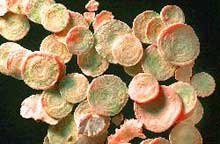Fewer Infections may mean less antibiotic therapy
Public health officials concerned about the rising problem of antibiotic resistance ¾ the immunity that bacteria develop to common prescriptions ¾ may have an ally in a common household beverage. Findings published in a research letter to the editor in the June 19, 2002 issue of The Journal of the American Medical Association (JAMA) indicate scientists have discovered that regular consumption of cranberry juice cocktail may offer prote

Drilling for oil is expensive – and only too often unsuccessful: in 80 to 90 per cent of all attempts the drill head ends up in worthless sediment rather than hitting the black jackpot as intended. In this way, with every unsuccessful drilling, companies squander several million euros. Yet there is an alternative: the use of tiny fossilised single-celled organisms can reveal to the expert where prospecting for oil is worth while, a dying art at which only a few specialists worldwide still remain prof
A study of the ancient Mediterranean Sea will help to produce more accurate predictions of climate change.
A team led by Royal Holloway geologist Dr Michal Kucera will map sea-surface temperature of the Mediterranean over past millennia. The data will provide a new target to test the computer models on which our predictions of climate change are based.
We currently make climate change predictions using mathematical models developed using climate records of the last two centuries. T
Plymouth researchers will be presenting new research findings at an international conference they are hosting in the city next month.
Professor Paul Worsfold, Co-director of Plymouth Environmental Research Centre (PERC), heads the Plymouth team working on a three-year research project which investigates the role of iron in ocean productivity and climate change. Plymouth is one of 12 European universities taking part in this ‘IRONAGES’ project.
Professor Worsfold commented: “We are
The SUMER instrument on the ESA-NASA SOHO spacecraft has measured amazing wind speeds during its observations of the Sun. It sets a new record in its examination of two loops of gas arching in the solar atmosphere, where NASA`s TRACE satellite spotted bright blobs of gas. Shifts in the wavelength of ultraviolet light from highly ionized neon atoms, seen by SUMER, revealed steady wind speeds of up to 320 000 kilometres per hour. That`s fast enough to cross the Atlantic Ocean in less than a minute.

Record low numbers of highly-prized squid have devastated the Falkland Islands fishery this year. Less than 10,000 tonnes have been caught so far, making this the worst year since the fishery began in 1987. As described in this week`s SCIENCE British Antarctic Survey (BAS) scientists believe unfavourable oceanographic conditions in squid spawning grounds caused the slump in the fishery which is normally worth £17 million ($US 25 million) in licence fees.
The flying squid Illex argentinu